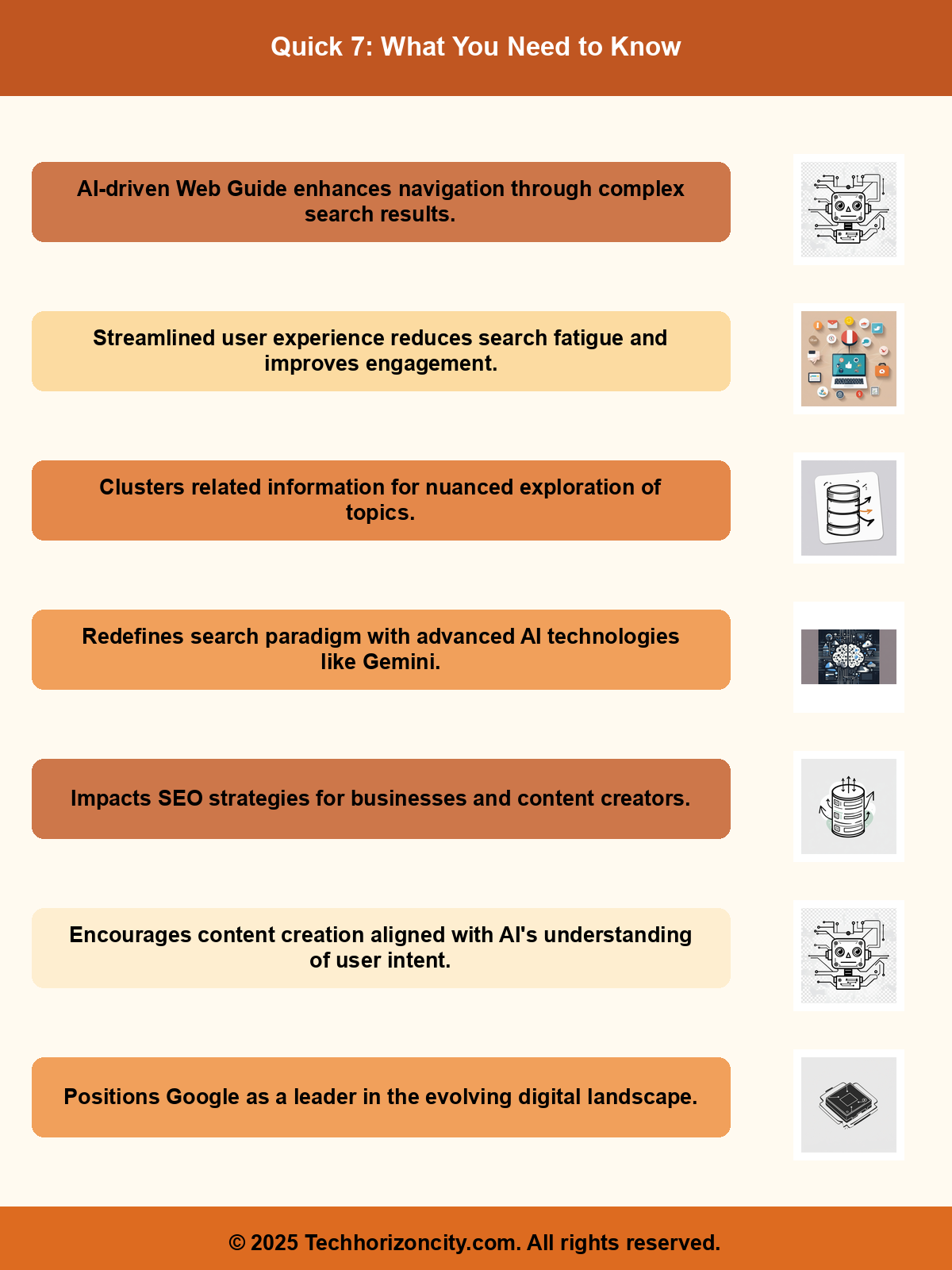Executive Summary
The digital landscape is ever-evolving, and Google continues to lead the charge with innovative updates to its search capabilities. The introduction of the Web Guide, an AI-driven feature designed to enhance user navigation through search results, marks a significant leap forward in how we interact with online information. This initiative, part of Google’s Search Labs, promises to streamline the user experience, particularly for complex and open-ended queries. By leveraging advanced AI technologies like Gemini, Google aims to redefine the search paradigm, paving the way for a more intuitive and efficient search experience. However, this transition raises questions about user autonomy, information accuracy, and the broader implications for the search engine market.

Background Context
Search engines have traditionally relied on algorithms that rank web pages based on various factors, including relevance and authority. While these methods have served users well, the increasing complexity of search queries necessitates a more sophisticated approach. Google’s Search Labs initiative has been instrumental in testing and refining new technologies to enhance search functionality. The launch of Web Guide is a progressive step in this direction, utilizing artificial intelligence to categorize search results more intelligently. This feature aims to simplify the often overwhelming experience of sifting through vast amounts of data by clustering pages that address specific facets of a query, thus improving the relevance and usefulness of results for users.
For technical resources and innovative solutions, please visit EchoesOfCreationUS for specialized technical resources.
Analysis of Implications
The Web Guide’s implementation will likely have profound implications for both users and content creators. For users, particularly those engaging in exploratory or intricate searches, this feature could lead to more satisfying and efficient outcomes. By grouping related information, the Web Guide allows for nuanced exploration of topics without the clutter of unrelated results. This could significantly reduce search fatigue and enhance user engagement.
However, the implications extend beyond user experience. For businesses and content creators, the Web Guide may alter the dynamics of search engine optimization (SEO) strategies. As the AI technology behind this feature evolves, so too will the strategies needed to gain visibility within these newly organized search results. Creating content that fits into the AI’s understanding of user intent will be paramount, pushing marketers to adopt a more nuanced approach to content creation and distribution.
Discover exclusive offers and premium content at Active Living Offers – your gateway to enhanced productivity and lifestyle solutions.
Industry Impact Assessment
The introduction of Web Guide positions Google to further consolidate its dominance in the search engine market. As competitors strive to keep pace, the pressure will mount on them to develop their own AI-enhanced features. The landscape of search is shifting from a simple ranking system to a more interactive and personalized experience. This could lead to a re-evaluation of how smaller search engines or alternative platforms can remain relevant in a market increasingly defined by sophisticated AI capabilities.
Moreover, as Google continues to roll out and expand the Web Guide to other areas of Search, including the “All” tab, it will be crucial for stakeholders to monitor the effectiveness and reception of this feature. The success of such innovations can ultimately redefine industry standards, influencing how users interact with search engines and how businesses adapt to these changes.
Future Outlook
Looking ahead, the trajectory of AI in search is poised for rapid expansion. If Google successfully integrates the Web Guide into its primary search functionality, we may see a reimagined landscape where users not only receive information but engage in a dialogue with their search engine. This could lead to more personalized results that adapt to individual user behaviors and preferences over time.
Furthermore, as AI technologies advance, we might witness an increase in the ethical implications surrounding data usage and privacy. Google will need to navigate the delicate balance between offering personalized experiences and respecting user privacy rights. As regulations around data usage tighten globally, Google’s approach to user data will be scrutinized more than ever.
Conclusion with Key Takeaways
Google’s introduction of the Web Guide is a bold step toward transforming the search experience through AI. By focusing on enhancing user navigation and streamlining complex search queries, the company is set to refine how we access information online. However, this innovation comes with challenges, from the need for content creators to adapt their strategies to potential privacy concerns that may arise with increased personalization.
As the Web Guide experiment progresses, stakeholders across the industry should remain vigilant, ready to adapt and innovate in response to this new paradigm. The future of search is not just about finding information; it’s about engaging with it more intelligently, and Google’s latest initiative could very well be the catalyst for this evolution.
Disclaimer: This article was independently created based on publicly available information and industry analysis.
